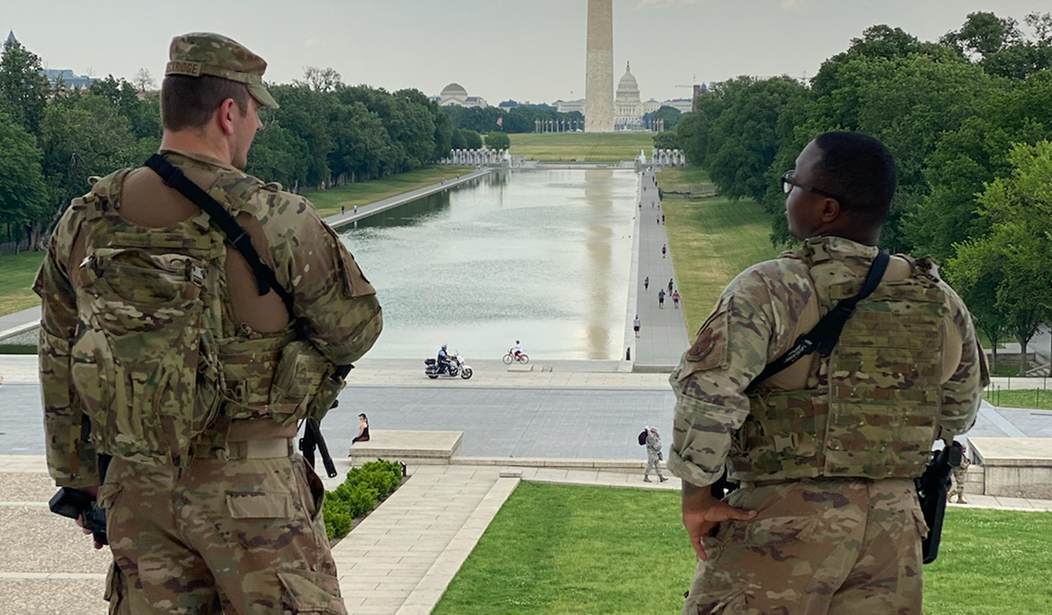The remarkable events of 2020 and continuing into this year have shown the American people the exemplary service and devotion to duty of the U.S. National Guard. From supporting public safety missions, to administering public health duties, to providing ongoing natural disaster relief, to serving in combat overseas, Guardsmen and women have served admirably and professionally across a range of crises and needs. And, in a most high-profile capacity, the National Guard has also been called upon to stand watch in Washington, D.C. to ensure order and security around the nation’s capital.
That deployment – which drew upon forces from several states, from New Jersey to Ohio, to Wisconsin, to Hawaii, and which became highly politicized at times – finally concluded in late May. In fact, at the height of the mission, more than 25,000 National Guard troops were stationed in the capital throughout late winter and into early spring. And now, after the perimeter fence has come down, and after all of the Guard troops posted around the capitol complex have packed up and gone home, the bill is due.
That bill – a not insignificant tab of $521 million dollars – is the total amount covering all the costs of keeping the National Guard deployed for months at a time, from billeting and food to pay and travel. That bill – needs to get paid back to the citizen taxpayers of the States that sent their units to Washington. That bill – should be elevated and fast-tracked as a legislative priority.
Unfortunately, like everything it seems nowadays, this issue has become mired in politics. What should be a clear-cut, simple and unfettered reimbursement back to the States for their commitment of troops in the name of security – has now become political football, punted back-and-forth to score points, or to gain leverage as part of some other legislative negotiation. Members have been parrying on the issue for weeks, without much success in addressing the situation. Some suggestions have been offered – but nearly all of them are challenged by complicating factors, like the close partisan divides in both chambers.
Recommended
And while the jockeying in the committees and halls of Congress might make sense to legislators who are used to the bickering game – inaction and delay on paying back the States will have real-world, on-the-ground consequences for National Guard units, individual service-members, and the communities they serve.
More specifically, the longer the days and weeks drag on without a timely reimbursement back to the States, the greater the likelihood that Guard units across the States will have to start making tough budgetary decisions. These are the kinds of decisions that involve prioritizing mission sets, grounding aircraft, triaging safety obligations, reducing drilling commitments, and cutting back on training.
Of course, tight budget environments often see these kinds of sacrifices being made by military units; training is often the first thing to go when funding becomes an issue.
But these reductions can have multiple negative effects down the line – on everything from operational readiness, to troop health, safety, skill retention, unit cohesion and morale. Units that can’t drill lose their edge, their effectiveness, and their ability to effectively respond to national needs, whether at home or abroad. As the country continues to push through a period of social instability, uncertain public health, and a looming hurricane season, the National Guard is the last entity that should be forced to stand down because it doesn’t have the operating capital to do its job for the citizenry.
That members of Congress cannot come together, and find a way to expeditiously pay back the States for their commitment isn’t altogether surprising, even if it is disappointing. And in many ways, it is unfortunately emblematic of our nation’s broken politics. In fact, one wonders what the priorities of Congress are if they can’t find the time, legislative creativity, or bipartisan goodwill among one another to simply pay back the men and women who provided their protection for several months. But as long as the National Guard stands ready to serve the American people, there should remain enough motivation among policy-makers to do the right thing.
The $521 million owed to the States for their service in our capital city at the beginning of this year is a sizable chunk – but it pales in comparison to what Congress is planning on spending on future items for the coming fiscal year. Of course, the big difference between the reimbursement to the National Guard – and what Congress wants to fund in other areas – is that this money is for a service already provided.
Time to pay the bill.























Join the conversation as a VIP Member